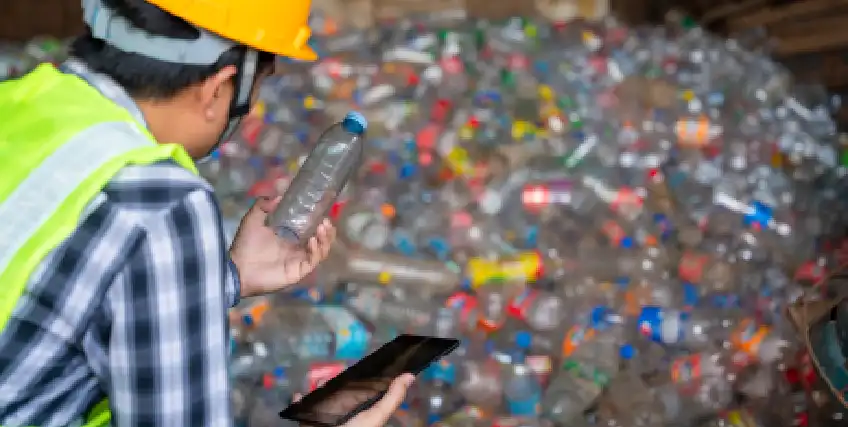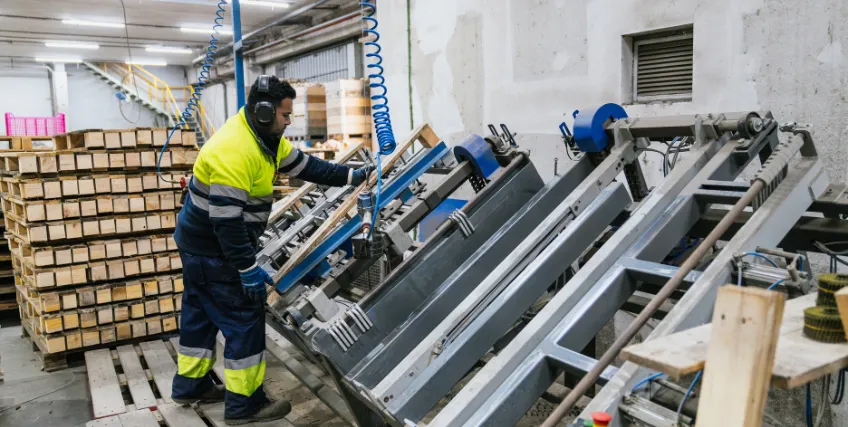Guide to Working Capital Loans for Recycling Businesses
Sep 04, 2025 | Last Updated on: Sep 08, 2025

The recycling industry plays a vital role in environmental sustainability and waste management. However, like any other industry, recycling businesses face cash flow challenges. Recycling business funding can provide essential short-term financial support, allowing companies to maintain operations, invest in growth, and manage unexpected expenses. This guide to working capital loans for recycling businesses explores how recycling businesses can benefit from working capital loans, what your options are, and how to apply successfully.
Understanding Working Capital Loans for Recycling Businesses
Working capital refers to the difference between a business's current assets and current liabilities. It is a key indicator of financial health and liquidity. Positive working capital means the business can cover its short-term obligations. Negative working capital may signal cash flow problems or excessive debt. For recycling businesses, working capital ensures smooth operations such as payroll, material purchases, equipment maintenance, and fuel costs.
Challenges and Opportunities of Working Capital Loans for Recycling Businesses
Challenges
There are quite a few challenges of working capital loans for recycling businesses. For instance, the fluctuating commodity prices of paper, plastic, and metal. There are also high upfront costs for equipment and machinery. Loans can require higher collection in certain months due to seasonal demands. Other challenges include rising fuel and transportation costs and delays in payments from municipalities and partners.
Opportunities
There is a growing demand for recycled materials, which creates opportunities for working capital loans for recycling businesses. Further opportunities include government incentives for sustainability. There are also opportunities for partnerships with e-waste, construction, and packaging industries. To seize these opportunities and mitigate challenges, businesses often require flexible funding solutions like working capital loans.
What Are Working Capital Loans for Recycling Businesses?
A working capital loan for recycling businesses is a short-term loan used to finance day-to-day business operations. It is not meant for long-term investments like buying land or major equipment but is ideal for covering immediate cash flow needs. The key features of working capital loans include loan terms that can span up to two years, weekly or monthly repayment schedules, collateral, and funding approval processes can be faster than other types of loans.
Why You Need Funding for Recycling Projects
Here are several scenarios where working capital loans help:
- Covering payroll during slow payment cycles.
- Purchasing bulk recyclables (scrap, plastic, metal) when market prices are low.
- Maintaining or repairing vehicles and balers.
- Meeting seasonal demand surges, such as after holidays or events.
- Upgrading software or technology to improve operations.
- Hiring temporary workers for large municipal contracts.
These loans enable continuity and flexibility, allowing businesses to operate without interruption.
Types of Working Capital Loans for Recycling Businesses
Different loan products may suit different business models. These include the following:
Term Loans
Term loans are fixed amounts that are repaid over a set term with interest. These types of working capital loans for recycling businesses are best for predictable short-term needs and may require collateral.
Business Line of Credit
Business line of credit loans provides flexible access to funds as needed. With these loans, there is interest only on the amount used. Business line of credit is ideal for ongoing or seasonal expenses.
Invoice Financing (Accounts Receivable Financing)
Invoice financing provides advance funding on unpaid customer invoices. This type of financing helps bridge cash flow gaps from slow-paying clients.
Equipment Financing
Equipment financing can be structured to cover specific equipment-related working capital needs. These types of financing can be used for upgrades and improvements of equipment.
SBA Loans
SBA loans are government-backed loans with favorable rates. These have slower approval processes but are beneficial for long-term stability.
Tips for Grants for Starting a Recycling Business
Match your business location to relevant programs. There are several opportunities for regional or state-specific grants. Identify eligible uses for equipment, infrastructure, collection expansion, MRF improvements, or educational outreach. Make sure to review and understand match requirements for funding and plan ahead for deadline requirements. Tap into federal resources and aggregators sites like Waste Dive and Resource Recycling News track new opportunities. Leverage technical assistance like recycling partnerships that offer support for communities and MRFs.
Determine Your Working Capital Loans for Recycling Business Needs
Before applying for a loan, assess your specific financial needs. Plan a cash flow forecast for the next six to twelve months. Identify potential gaps that can happen due to seasonality or slow payments. Calculate recurring operating expenses like rent, wages, and utilities. Estimate costs of maintenance, repairs, or material purchases. Review your accounts receivable and inventory turnover. Building out an organized financial picture ensures you don’t under- or over-borrow, reducing financial strain.
Requirements for Working Capital Loans for Recycling Businesses
Loan approval depends on a variety of business and financial factors. Some common requirements include ensuring that you’ve had an operating business for at least six months, can prove revenue, have a good credit score, and can share a business bank statement for about a year. Other common requirements include providing tax returns, balance sheets, and profit and loss statements. Also, have a business plan or loan usage statement. Startups may face more difficulty but can explore microloans or SBA options.
How to Apply for a Working Capital Loan
Here is a step-by-step application process for applying to working capital loans for recycling businesses.
- Assess your needs: Determine how much capital you need and for what purpose.
- Research lenders: Choose between traditional banks, online lenders, credit unions, or government-backed programs.
- Organize documentation: Prepare financial statements, tax returns, licenses, and bank statements.
- Apply online or in person: Submit application along with required documents.
- Review terms: Check interest rates, repayment schedules, fees, and penalties.
- Get your financing: If approved, funds may arrive quickly, depending on the lender.
Always review the Annual Percentage Rate (APR) and any hidden fees.
Using Working Capital Loans for Recycling Businesses
The key to effective use of working capital loans lies in purposeful spending. Smooth over seasonal income dips with your working capital loan for recycling business. Invest in efficiency improvements like enhanced software and innovative logistics. Hire staff to meet large contract deadlines. Purchase recyclables in bulk at discount prices. Cover urgent repairs to minimize downtime.
Avoid using working capital loans for long-term investments or non-urgent purchases, as this can strain short-term repayment capacity.
Risks for Working Capital Loans for Recycling Businesses
Working capital loans can be powerful tools—but they carry risks. These risks can include high interest rates especially with alternative lenders. The short repayment timeframes can often require strict cash flow discipline.
To avoid risks for working capital loans for recycling businesses, borrow only what you can repay comfortably. Create a repayment plan alongside your business cash flow forecast. Use working capital only for short-term needs and maintain a healthy credit profile.
Alternatives To Working Capital Loans
In some cases, working capital loans may not be the best fit. Consider these alternatives:
- Equipment Leasing: Spread costs of trucks, balers, or shredders over time.
- Grants and Subsidies: Government or environmental bodies may offer sustainability grants.
- Equity Financing: Sell a stake in your business to raise capital.
- Crowdfunding: Raise small amounts from a large pool of investors.
- Revenue-based Financing: Repay funding based on a fixed percentage of monthly revenue.
Tips to Get Approved for Working Capital Loans for Recycling Businesses
Maintain accurate and up-to-date financial records. Improve your credit score by paying bills on time and reduce your debt. Diversify your revenue streams by expanding into e-waste or construction recycling. Build a relationship with lenders through regular updates and transparent communication. Present a solid business plan that shows how the loan will be repaid and how it will generate revenue.
Final Thoughts on Working Capital Loans for Recycling Businesses
Working capital loans for recycling businesses are essential tools for those looking to maintain operational efficiency, respond to market changes, and grow sustainably. Whether you’re facing a temporary cash crunch or looking to capitalize on a new opportunity, these loans can provide the necessary financial support. Be sure to understand your business needs, choosing the right type of financing, and using funds strategically can drive your recycling business to success.
As the recycling industry continues to grow in importance and complexity, access to flexible and timely funding will be a competitive advantage. By preparing properly and managing debt responsibly, your recycling business can thrive—even in a volatile economic environment.
FAQs about Working Capital Loans for Recycling Business
What are SBA loans?
SBA loans are government-backed loans with favorable rates. These have slower approval processes but are beneficial for long-term stability.
What are term loans?
Term loans are fixed amounts that are repaid over a set term with interest. These types of working capital loans for recycling businesses are best for predictable short-term needs and may require collateral.
What are some scenarios where working capital loans help?
Working loans can help businesses cover payroll during slow payment cycles, purchase bulk recyclables when prices are low, and maintain or repair essential equipment. They can also support meeting seasonal demand surges, such as after holidays or major events, and fund upgrades to software or technology. Additionally, these loans make it possible to hire temporary workers for large municipal contracts.
How does invoice financing work?
Invoice financing provides advance funding on unpaid customer invoices. This type of financing helps bridge cash flow gaps from slow-paying clients.
What are the challenges of working capital loans for recycling businesses?
Some working capital loans for recycling businesses can require higher collection in certain months due to seasonal demands. Other challenges include rising fuel and transportation costs and delays in payments from municipalities and partners.
Frequent searches leading to this page
Related Articles
Term Loans are made by Itria Ventures LLC or Cross River Bank, Member FDIC. This is not a deposit product. California residents: Itria Ventures LLC is licensed by the Department of Financial Protection and Innovation. Loans are made or arranged pursuant to California Financing Law License # 60DBO-35839




